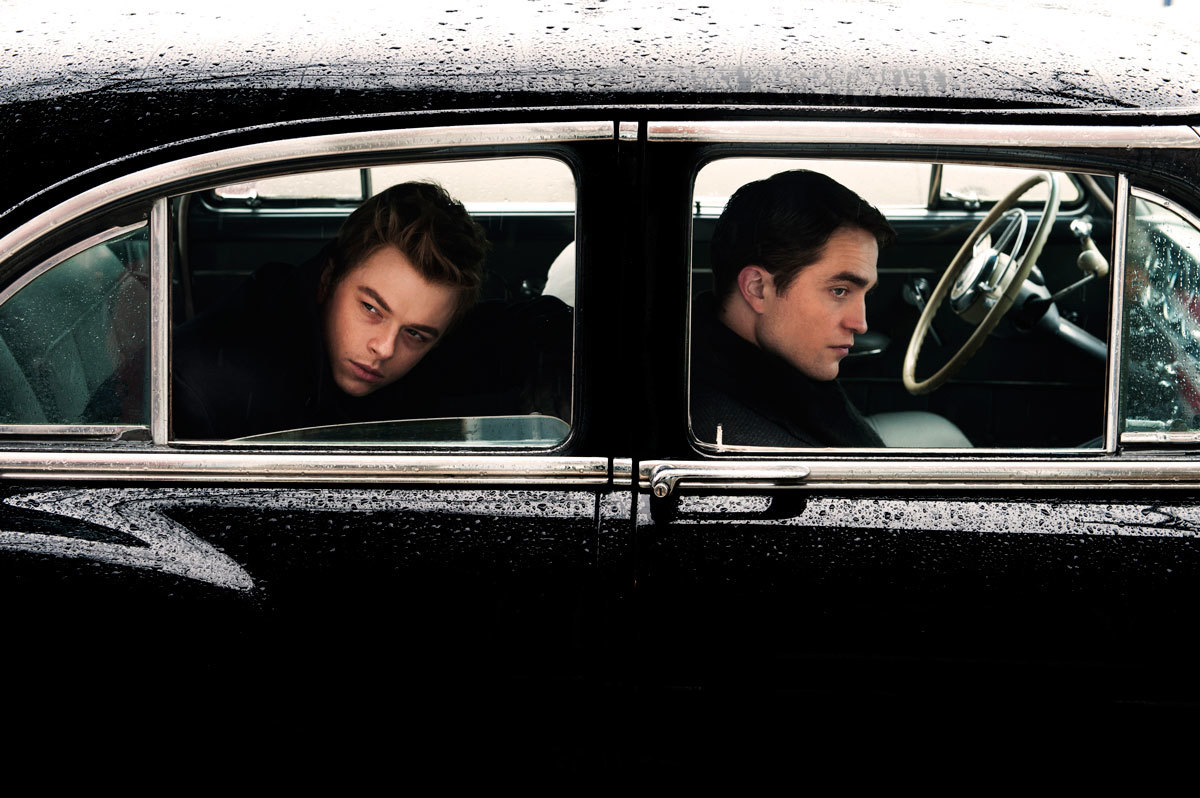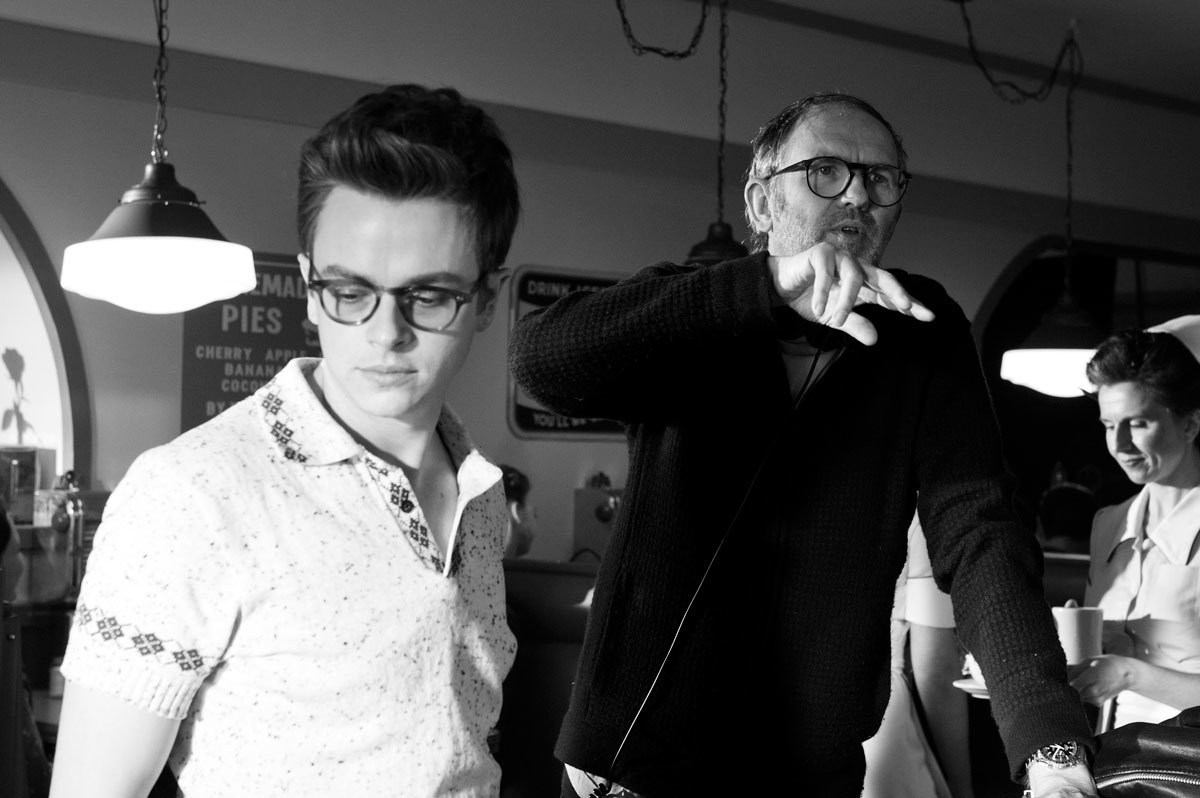Anton Corbijn found fame as a music photographer in the 70s and for his distinctive black and white shots. His first feature length film Control retained both aspects of the work, being about a musician, Joy Division’s Ian Curtis and shot in colour printed to black and white. Now the 60-year-old Dutch artist has turned the camera on a subject he knows plenty about, the relationship between photographer and subject. His latest film Life brings real colour to the real life professional friendship struck up between Magnum photographer Dennis Stock and rising star James Dean in 1955. Stock followed Dean to his family’s farm in Indiana, taking intimate shots of his home life. He also captured the small town boy on the brink of megastardom, most memorably in a Time Square shot that has since become one of the most reproduced of the 20th Century.
In Life, Robert Pattinson plays Stock, a documentarian eager to get the scoop and Dane Dehaan plays Dean, the actor reluctant to play the studio game. Both men want something from each other. From this, a friendship emerges. Life is beautifully shot, faithfully recreating the moments when those iconic photographs were taken. But it also delves into contemporary concerns about celebrity and art, photographer and subject, the delicacies of male companionship and inevitably – given that Dean died aged 24 just a few months after the images were taken – life and death.
Who was the initial draw for you, Stock or Dean?
It was Dennis Stock because the idea of a photographer who takes pictures of someone in the public eye rings true to me. I’ve been doing that since the early 70s. That the other person happens to be James Dean is a bonus, but I didn’t want to make a James Dean biopic. For me it was more about the photographer and his assignment and the balance between the two men.

The film depicts Dean under studio pressure and public scrutiny. Were you conscious that in casting Robert that the film would have a contemporary resonance about celebrity culture?
That was a kind of perverse pleasure maybe. Rob takes interesting roles, not pay check roles. That was already an interesting aspect of him. He’s a very intuitive character, kind of insecure. I wanted that element of the character in the person who played him. A lot of people see Rob’s name [attached to the film] and think he’s playing James Dean. It’s funny.
Were you a fan of Stock beforehand?
I can’t say he was on my radar. I knew the most famous pictures. When I read the script, I researched. It was great to discover his work. Dennis Stock was a great documentary photographer. There was not a lot of set up stuff; he was catching moments.
What do you think are the best things about the James Dean images?
It’s hard to ignore the aftermath, that James Dean died. That you have these private pictures of him in Indiana is fantastic. There were quite a few other photographers who took pictures of him on set or for magazines but Dennis Stock had this documentary stuff, a real insight into James Dean which makes the pictures very valuable.
As a photographer, your subjects have always been musicians. Did that give you greater freedom than if you’d have worked with actors in the stricter studio system like Stock has to?
That’s true but I remember when I started people didn’t really take to my pictures. In the 70s it was very hard for me to find a place to publish my work and now a lot of these pictures are in museum shows. Sometimes you work in a way that’s not right for the time yet. People catch up later if you do things your way.

Did you find it difficult to convince potential subjects when you were unknown?
I started locally and that makes a big difference. I didn’t start with U2 or Tom Waits. There was a Dutch musician Herman Brood. I met him when I just started taking pictures. We spent time together. He was very photogenic and an interesting man. He became the biggest rock star we ever had in Holland. He started being photographed by everybody. He really took off and I lost him but I felt ‘you’re mine, what happens here?’ I didn’t understand that balance. There’s a reference to that in the film where Dennis Stock finally persuades James Dean to pose for him and Dean says ‘I understand, I want to help you’ and Dennis Stock says ‘no, no, no I’m helping you.’ If you don’t understand the balance between you and your subject, you can be in for a bad surprise. I was young, I didn’t understand the balance either.
How would you have persuaded James Dean to be photographed by you?
Oh I don’t know. It also depends where I was in my so-called work or career. It’s a lot easier for me to ask somebody if I can take a photograph than it was 40 years ago. The work you have done proceeds you. If you’re starting, it’s difficult and everybody wants to take a picture of somebody who’s popular. That’s not really what photography is about.
What is photography about?
It’s about a translation of a meeting with somebody. If you are talking about taking a portrait of somebody you have a few elements which come into it: your vision of the person, something of the real person needs to come through the picture and you’d like to take a picture that hasn’t been seen before. It has to be a balance of these three elements. If a person is well known or not, it doesn’t matter. So many pictures nowadays seem to be about an idea rather than the person.
You’ve said you’re drawn to loners and you’re doubling up with this film with Stock and Dean. What’s the attraction?
I can identify with them most because at least for long periods of my life that’s how I lived. I also feel deep down that a lot of your life is just you on your own; a lot of decisions is just you. But I didn’t set out to make films about that, the stories just seem to have that element that I’m drawn to.
Life is in cinemas 25th September
Credits
Text Colin Crummy
